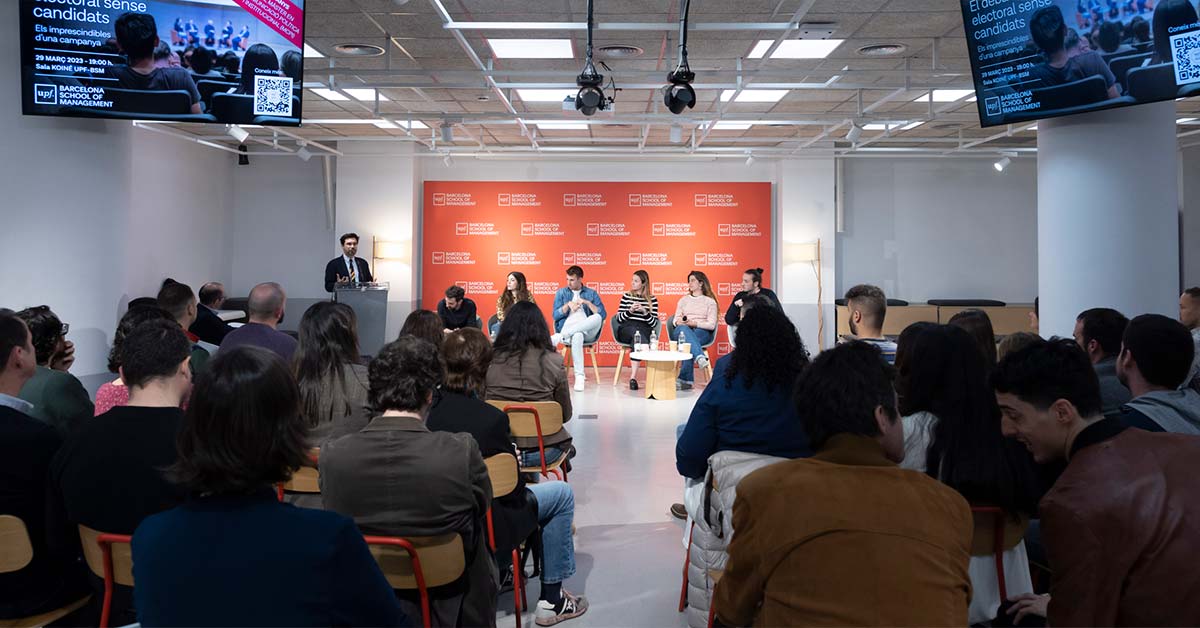
The Lifelong learning master's degree in Political Communication is structured in 8 subjects or blocks of knowledge in which all the contents and tools necessary to transmit the knowledge and skills required by professional development are revealed.
In addition, students will choose a topic to carry out the Master's Final Project which will be guided by a tutor with experience in Master's Projects. This work can be done individually or in groups and will help you to put into practice the theoretical and practical knowledge acquired throughout the course.
- Analysis of political behaviour: behaviourism and the theory of rational choice
- Political participation: relevance, typologies, and explanations
- Political culture and attitudes
- Models for choosing how to vote
- Analysis of public opinion from the classical and empirical traditions
- Public communication, democracy, and opinions
- The media in the opinion-forming process
- The relationship between journalists and politicians
- What a speech is and how it is made
- Speechwriting: actors and forms
- Crisis communication on social networks
- Preparation of plans and protocols for emergency situations
- Co-ordination of institutions in periods of crisis
- The permanent campaign
- The actors of political communication: from the spokesperson to the head of the campaign
- Storytelling: the political story
- Leadership building
- Electoral research
- Planning and coordination of the electoral campaign
- External and internal audiences
- The dissemination of messages
- Election campaign evaluation
- Communication of public institutions
- Open government, social media management, and phase 3.0
- Creation of a brand
- Towards a greater definition of the professional profile
- Strategic and transversal role of professionals in institutional communication
- The institutional message
- Individual leadership and team leadership
- Local communication strategies: external and internal communication
- Municipal public relations
- City projection and speeches
- Coalitions and political negotiation in the local world
The Master's Final Project can be done individually or in groups (maximum of three students) and requires putting into practice the theoretical and practical knowledge acquired throughout the course. This work can have a practical aspect (designing an institutional communication or political communication campaign, for example) or a theoretical aspect (analysing the use of social networks or the media of a party in a specific electoral period, among others) and, in both cases, ends with a public presentation before a committee made up of three professors from the program.
Once you have passed the program, you will receive the following electronic degree certification (eTítulo©): Lifelong learning master's degree in Political and Institutional Communication, awarded by the Pompeu Fabra University. The eTítulo© will be issued in Catalan, Spanish and English.
The electronic degree certification (eTítulo© ) is an authentic digital degree, issued in pdf format and electronically signed, with the same legal validity as if it were in paper format.
The Master in Political and Institutional Communication also includes the possibility of participating in practical activities and activities for personal and professional growth such as:
- Sessions and conferences at institutions: In our commitment to providing unique experiences, we strive to organize visits to emblematic institutions such as the European Parliament, the Congress of Deputies, and the Parliament of Catalonia, so you can get an up-close look at the daily lives of professionals.
- UPF-BSM Inside: is a group of interdisciplinary subjects (applied data, communication, creativity, innovation and project management, sustainability and leadership among others) that, if you take this program, you can access at no additional cost. They are 100% online and you can take them throughout the academic year at your own pace, as they have been designed as self-study subjects.
- International mobility: The UPF Barcelona School of Management offers you the possibility of expanding your training and international vision through the International Mobility Programme. Extend your studies extracurricularly, during the academic year following the completion of your Master's, at a top-level institution. Limited places.
Higher university graduates.
Other candidates without the required university degree may take part in the selection process by virtue of their academic or professional merits.
Those participants who do not have Spanish as one of their mother tongues or who did not have it as a teaching language in their training studies, must prove that they have at least a B2 level of Spanish (Common European Framework of Reference), as well as fluently take part in a personal interview with the academic director, if necessary.
Our admission process consists of a rigorous evaluation of each application to preserve the quality of the group as well as the training, experience, and work capacity of all students.
The UPF Barcelona School of Management offers you different means of financing so that you can take any of our programs without worry. We offer you the opportunity to finance part of your program, either by rewarding your talent through scholarships, through grants from entities dedicated to promoting education or through collaboration agreements with financial entities.
The Master in Political and Institutional Communication offers transversal training to understand all the actors and institutions involved in political communication. Thanks to this coverage, the student will learn to apply the knowledge acquired to their professional career.
The Lifelong learning master's degree in Political and Institutional Communication is a face-to-face program that offers solid training in order to understand the interaction between politics and the media.
Throughout the lifelong learning program you will learn to design powerful messages for parties and institutions, you will develop electoral marketing campaigns and you will analyse how public opinion is affected by opinion leaders, think tanks, or lobbies. You will learn how to manage any crises that may appear, either by organizing emergency protocols or working with different institutions and media. You will also learn to adequately transmit the values of institutions and you will discover how governments and political parties use new technologies to communicate with the public. All this with the aim of becoming a professional in political marketing, an expert in political communication, and integrating yourself into the labour market.
Thanks to the design of the syllabus taught by expert professors and professionals, you will delve into the optimization of political and institutional communication processes in a transversal and plural way.
The Lifelong learning master's degree in Political and Institutional Communication is endorsed by Pompeu Fabra University, the 1st Spanish university and the 15th best university in the world (of those with less than 50 years), according to the Times Higher Education ranking. In addition, UPF Barcelona School of Management has EQUIS accreditation, the most prestigious institutional recognition for business schools globally.
Thanks to its multilevel approach, the master's degree allows a wide range of professional opportunities in the labour market, depending on the participant's previous professional experience and their field of interest. In addition, it offers the possibility of extracurricular internships for those students who want to start in the sector.
The Master's program in Political Communication includes visits to different institutions to learn first-hand about the day-to-day life of experts in political and institutional communication, as well as the political reality of the moment. In addition, you will learn to evaluate different political behaviour and to analyse the media and current public opinion.
The master's seeks to offer you a plural view, both in the content and in the teaching staff, through the maximum representation of political parties and Spanish and Catalan public institutions.
You will acquire skills from professionals and academics in political and institutional communication who have worked on highly relevant political and institutional campaigns and who have advised local, national, and international political leaders.
The master's offers the possibility of complementing learning with the experience of internships in consultancies, political parties, and institutions, which will facilitate your integration into the labour market.
Study at a school accredited by EQUIS, an international distinction that guarantees the quality of our institution and makes us the 1st school of management linked to a public university with this accreditation in our country.
The Master in Political and Institutional Communication is aimed at graduates of any discipline. It is also open to professionals who demonstrate relevant experience in the field of political marketing and political or institutional communication.
UPF Barcelona School of Management has EQUIS accreditation, the most prestigious institutional recognition for business schools globally, and places itself among the top business schools in the world.
The students of the Master in Political and Institutional Communication come from different areas of knowledge, mostly Journalism and Political Science. However, each year the classrooms have students from other fields as varied as Law, Philology, or Advertising and Public Relations.
The teaching staff of this master's is made up of different communication professionals: political advisers, consultants, communication technicians from different levels of institutions, etc. All of them have extensive experience in the world of political communication and a long professional career. Come and get to know them.
Each module is evaluated independently:
- 10% participation in the classroom
- Between 20% and 30% (depending on the module) of the activities and presentations made in class
- Between 70% and 60% for the final task of the module.
- Election campaign director
- Advisor or person in charge of electoral communication
- Institutional or political communication management
- Spin Doctor
- Director of institutional press office
- Political and electoral consulting
- Political/electoral speechwriter
- Head of institutional or political press releases
- Communicator in administrations (Presidencies, Ministries, Town Halls, etc.)
- Communicator in institutions (NGOs, Think Tanks, Associations, Interest Groups, etc.)
- Community Manager of political parties or institutions
- Specialist in digital content and social media for institutions and political parties
The methodology of the Master in Political and Institutional Communication is framed, mainly, around different types of sessions that are complemented with conferences, practice, visits to institutions and the monitoring of the Master's Final Project.
On the Lifelong learning master's degree in Political and Institutional Communication, a program for an international audience, you will learn to design effective political communication campaigns and political and corporate speeches and to manage their communicative impact through online and offline channels. We offer you a transversal program with a plural perspective: the course classes are taught by academic experts and professionals with great experience who represent the plurality of political parties and institutions.
- Carles Aceña Foguet
Government of Catalonia’s Communication General Director since 2021. Previously, head of communication of Esquerra Republicana de Cataluña (ERC). - Elisenda Alamany Gutiérrez
Politician. Councilwoman at the Barcelona City Council. - Reinald Besalú Casademont
PhD in Public Communication from the Universitat Pompeu Fabra. Deputy Director of the Ideograma UPF Chair of Political Communication and Democracy. He has been a professor and researcher at UPF, and is now a professor at the Universitat Rovira i Virgili. - Elisabet Borreda Diaz
Head of Communications for the Department of Social Rights of the Generalitat de Catalunya. - Josep Maria Brugués del Moral
Corporate communication and crisis consultant.
Postgraduate degree in Public Relations from the University of Washington at Seattle (USA). - Pau Canaleta Heras
Political and institutional communication consultant.
He is also a regular contributor to RAC1, Canal 324, Catalunya Ràdio, Radio Euskadi, 8TV, Cadena SER, Hora Nova and Diari de Girona. - Arantxa Capdevila Gómez
PhD in Audiovisual Communication. Professor at the Universitat Rovira i Virgili. Her areas of research are public opinion and discursive resources in political communication, especially the use of rhetoric and metaphors in political language. - Antonio Carmona Arévalo
Head of press at RENFE and Head of Communication at RENFE-Catalunya. - Santiago Castelo Heymann
Political analyst and consultant at Ideograma. PhD in Communication from the Universitat Pompeu Fabra. He is the author of several academic articles and expert in political leadership constructions in social networks. - Mireia Castelló Fosch
Political scientist and political communication consultant. - Laia Castro Herrero
PhD in Social Sciences from the University of Fribourg. Lecturer in Political Science at the University of Barcelona. Expert in public opinion, behaviour and political mediatisation. - Aleix Clarió Herranz
Advisor in digital communication. He has advised President Quim Torra, the Ministry of Digital Policies and Public Administration, and the Ministry of Research and Universities of the Generalitat. - Joel Codina Valls
Communicator, strategist and photographer. He has worked as head of image of PDeCAT and in the Vice-Presidency of the Generalitat with Pere Aragonès. He has been responsible for the image of the Ministry of Research and Universities. - Joan Corbella Cordomí
Professor of Journalism at the Universitat Pompeu Fabra. Researcher in communication policies and structures, and expert in audience analysis. He is content director at the Observatorio de la Producción Audiovisual (OPA). - Jaume Duch Guillot
Dircom and spokesman of the European Parliament. - Josep Escudé Pont
Dircom of the Parliament of Catalonia. - Carles Fabró Ràfols
Chief of protocol for decades in the Government of Catalonia. - Ana Freire Veiga
PhD in Computer Science, expert in artificial intelligence. Professor and Vice Dean of Social and Academic Impact at the UPF Barcelona School of Management. - Pablo Gómez Domínguez
PhD in Communication from Pompeu Fabra University.
Lecturer and researcher at the UPF specializing in audiences and media behavior. - Jordi Graells Costa
General Director of Citizen Attention of the Generalitat de Catalunya. Graduate in Human Geography. - Meritxell Grané Solsona
Specialist in protocol. - Marc Grau Solés
Consultant specialised in public policies. - Antoni Gutiérrez-Rubí
Communication advisor and political consultant.
Director of the political and institutional communication consulting firm Ideograma. - Marc Homedes Moradell
Head of press of the General Directorate of Civil Protection.
Postgraduate degree in Strategic Communication from Esade. - Mònika Jiménez Morales
PhD in Audiovisual Communication from the Universitat Pompeu Fabra. Advertising and Public Relations at UPF. Her research interests focus on strategic communication and the impact of advertising on society. - Mihalis Kavaratzis
Professor of Marketing at the University of Leicester.
PhD in City Marketing from the University of Groningen. - Ferran Lalueza Bosch
Professor of Information and Communication Sciences at the Universitat Oberta de Catalunya (UOC) and expert in crisis communication.
D. in Journalism from Pompeu Fabra University. - Marcos Lamelas López
Journalist of political, economic and financial information at El Confidencial. PhD in Journalism from the Universitat Pompeu Fabra. - Jordi Llobet Llorens
Communication consultant, expert in public speaking and spokesperson in critical situations. - Joan López Alegre
Journalist. Strategycomm CEO. Communications Director of the European Parliament Vice-President (2004-2014), he has participated in the management of municipal, regional, general and European campaigns for Cs, PP, UDC, VOX and PSC. - Guillem López Bonafont
Political scientist and digital strategy and reputation consultant. - Rafael López Rueda
Sociologist. He has been a consultant in different public administrations: Barcelona City Council and Government of Spain, and deputy in the Parliament of Catalonia for the PP. He is currently a consultant specialised in political and social analysis. - Cristhian Lozano Recalde
Researcher in Crisis Communication at Pompeu Fabra University and communication consultant. - Clàudia Martínez Piñero
Head of Press for Junts per Catalunya. She has also been responsible for communication in the CAR of Sant Cugat and press officer of the Olympic pre-candidacy Pirineus-Barcelona. - Laia Mauri Baraza
Political scientist and communication advisor, currently in the CUP’s communication and press team. Expert in Venezuelan politics, gender and governmental systems. - Marcel Mauri dels Rios
PhD in Communication and professor at Pompeu Fabra University. - Jordi Muñoz Mendoza
PhD in Political Science from the Universitat Pompeu Fabra. Professor of Political Science at the University of Barcelona, expert in demoscopy and electoral processes. Currently, director of the Centre d'Estudis d'Opinió de la Generalitat. - Patrícia Plaja Pérez
Journalist. She is spokesperson for the Government of the Generalitat. She has also been head of Communication of the Mossos d'Esquadra. - Xavier Peytibi Carbonel
Political and public communication advisor at the consulting firm Ideograma. Graduate in International Relations from the University of Barcelona. - Ivan Redondo Bacaicoa
Consultant and former cabinet director of Moncloa with Pedro Sánchez. - Antoni Rodon Casarramona
European PhD in Political Science. Lecturer at the Universitat Pompeu Fabra. He has been a postdoctoral researcher at the London School of Economics and Political Science (LSE) and at Stanford University in California. His research interests include participation and comparative politics. - Rosario Rodríguez García
Dircom of the Congress of Deputies. - Joan Roselló Cardona
Managing Partner at Public Affairs Experts.
PhD in Law from the Complutense University of Madrid.
He is also a member of the chair of the Universidad Autónoma de Barcelona. - Xavier Ruiz Collantes
Department of Communication professor at the Universitat Pompeu Fabra. Specialist in persuasive message analysis, critical discourse analysis and narrative semiotics. - Francesc Santiago Camps
Technical press coordinator of the Mayor's Office of Barcelona. - Marçal Sarrats Ferrés
Dircom of President Pere Aragonès. - Anna Maria Sendra
Head of Communication for the Barcelona Provincial Council. - Eulàlia Solé Tomàs
Political Scientist and professor at Pompeu Fabra University. - Guillem Suau Gomila
PhD in Communication from the Universitat Pompeu Fabra.
Journalism professor and researcher at the University of Lleida. He has also been a lecturer and researcher at the UPF. His research interests are political communication, crisis and emergencies, and social network analysis. - Sara Vinyals Mirabent
PhD in Communication from the Universitat Pompeu Fabra. Professor of Advertising and Public Relations at the Universitat Autònoma de Barcelona. Her research interests focus on the areas of persuasive communication, with special attention to advertising and branding.
In our commitment to providing unique experiences, we strive to organize visits to emblematic institutions such as the European Parliament, the Congress of Deputies, and the Parliament of Catalonia, so you can get an up-close look at the daily lives of professionals. Expand your knowledge and immerse yourself in the fascinating world of political and institutional communication.
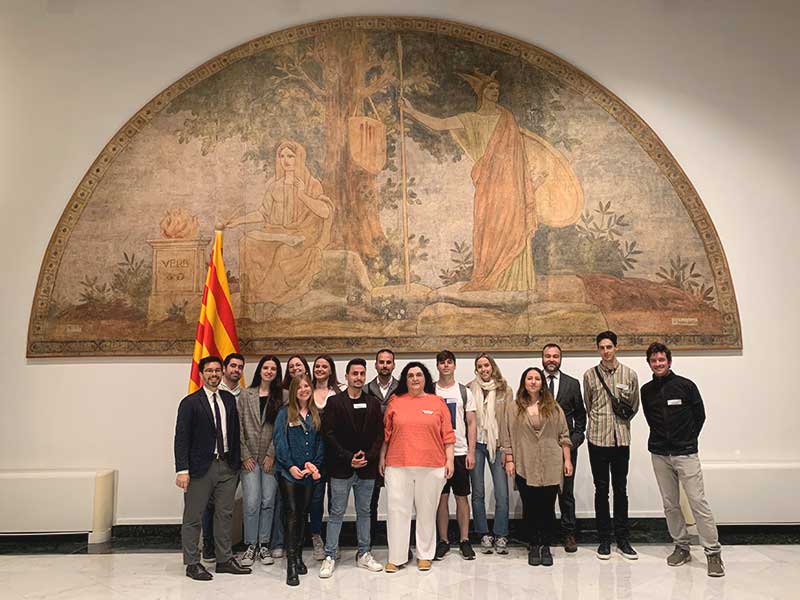
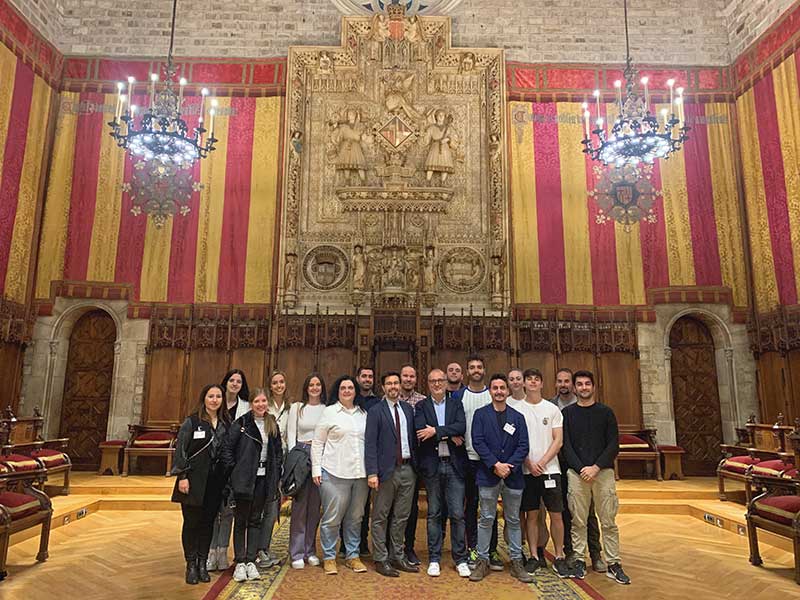
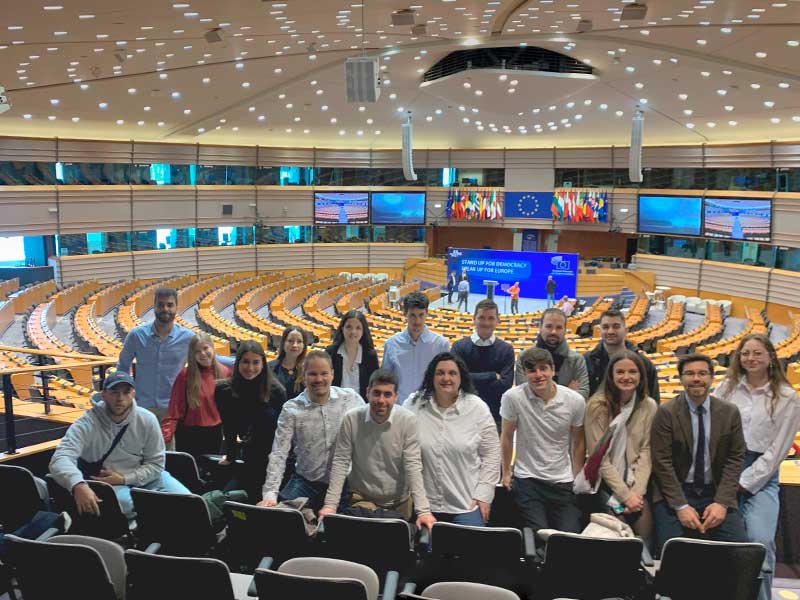
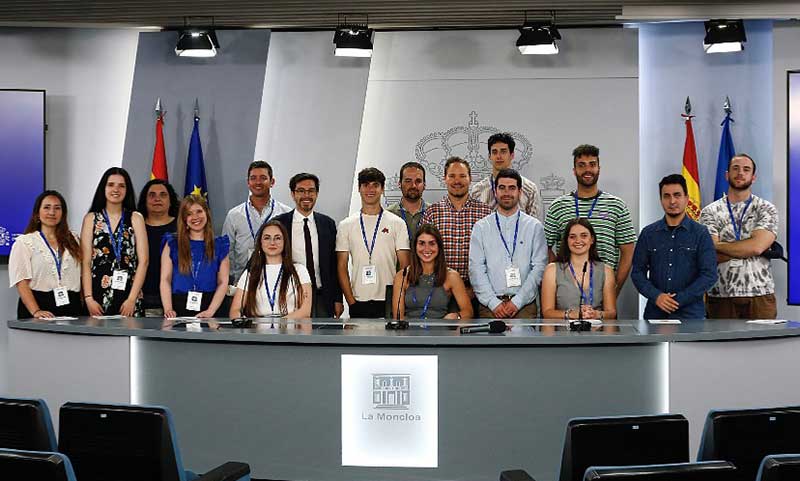
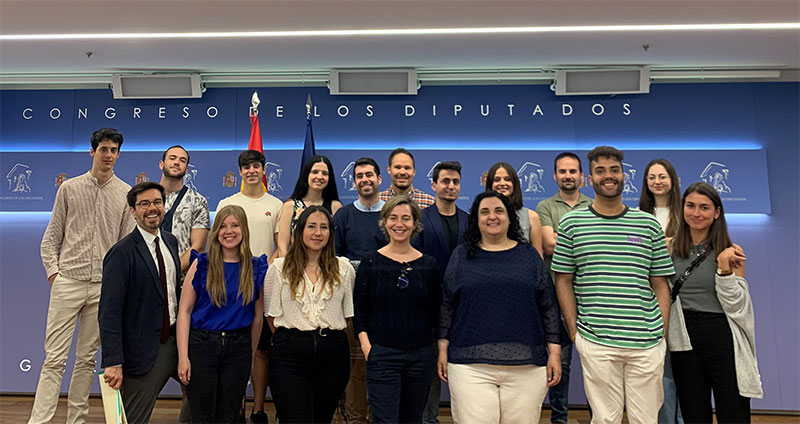
Master in Political and Institutional Communication
